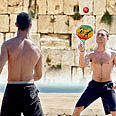
Jerusalem and Tel Aviv are the expression of two very different faces of Zionism
Despite it all, I'm still a Jerusalemite
It's not easy for a gay, left-wing secularist to live in Jerusalem
They say that nine measures of beauty were given to Jerusalem. But at the same time, we can also say the city was also given nine measures of intolerance.
Jerusalem is a tough city: Extreme, intolerant, unbending. Sometimes, it even seems the city has lost its sanity. The city's beauty (which in recent years has been buried under mountains of garbage and dirt) cannot hide the difficulties of living here. It is the poorest city in Israel (the poorest Jewish city that is. Bnei Brak runs a close second), and each part of the city's population lives its own life, to such a degree that it seems that there is nothing to join them together.
Jerusalem is a tough city. It's tough for the secular, tough for left-wingers, tough for gays and especially tough for me – I fit into all three categories. And let us not forget the city's Arab population, who are part of the city tapestry but badly discriminated against with regard to all budgetary matters and services that the municipality is supposed to provide.
Short distance, huge gap
It's just 60 kilometers (37 miles) from Jerusalem to Tel Aviv. That's about a 40-minute drive, but the short geographical distance does not do justice to the yawning gap that separates the two cities. Jerusalem and Tel Aviv are the expression of two very different faces of Zionism that have yet to find a common denominator to unite them.
And the current goings on in the capital only sharpen this distinction and widen the gap – Mayor Uri Lupolianski's term in office will be remembered as one of Jerusalem's worst periods: Darkness has descended on everything; extremism and intolerance have taken over the city.
Whereas Tel Aviv has become the city of freedom, Jerusalem has become the holy city. But under the image of holiness, the city has become decidedly unholy. It seems to me that the city higher-ups have forgotten that it's not the stones that are holy, but rather the people.
Last of the Mohicans
So why do I stay? After all, most of the friends I grew up with left the city long ago for freer pastures. They call me the Last of the Mohicans, and tease me that I'll be the one to turn out the light, that I'll be the last secular Jerusalemite to bail out. The threatening letters I've received, and the anti-Saar posters that have appeared in the city's haredi (ultra-Orthodox) neighborhoods don’t do much to endear me to it.
But still, there is something about this city that keeps me here. Maybe it's the quiet of Friday afternoon; maybe it’s the clear mountain air. Maybe it’s the feeling of history that beats inside you. It could even be the weather, something I appreciate anew every time I come back from a hot, humid summer day in the turbo-oven of Tel Aviv.
Maybe it’s the colorful tapestry of people here. They may not know how to live together, but they also make the city so special and exciting.
Family feeling
Despite the size (Jerusalem's city limits are a kilometer larger than Paris), Jerusalem has a family feeling to it. This feeling has accompanied me to the Jerusalem cinemateque, where I feel like I know everyone, even if I've never met anyone I know there.
There are other such places that can only be found in Jerusalem. The original Abu-Shukri hummus at Damascus Gate in the Old City, the cafes and unique architecture of Emek Refaim Street (it's also the city's flattest street), the view from the Promenade near Talpiot, moving and impressive despite the fact there is no beach to see. And there are Jerusalem's quality cultural creations. Despite it all.
Of course, there is the "Open House," the city's gay community center, which manages to prove that even in Jerusalem, despite incitement, stabbings and municipal disregard, there is a proud, thriving homosexual community. It is a small "miracle" we are able to host an annual pride parade, but we have managed to do so, and the march has become a Jerusalem tradition.
Home in Jerusalem
I was born in Jerusalem. Jerusalem is my home, and I am simply in love with this city. I've been here my entire life, walked the alleyways filled with magic and mystery, and I know just about every stone personally.
It's a complicated love-hate relationship: Jerusalem is my home, and it is the city where I've been elected to serve on the city council. It is the place I fight for, and still believe I can change. So Jerusalem, here I come. You've never given up on my, and I am not yet ready to give up on you.
Netanel Saar is a Jerusalem city council member for the Meretz-Yahad party










